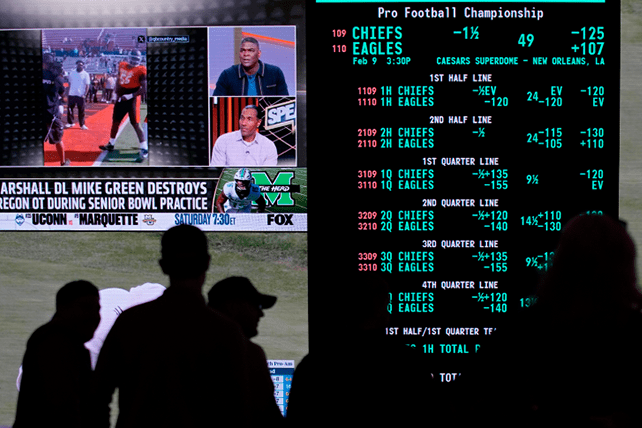(RNS) — Les Bernal has a message for the millions of Americans who will bet on this year’s Super Bowl using betting apps and other legal sports books.
The house always wins.
Which means you will likely lose.
“We laugh it off and say, oh the house always wins,” said Bernal, national director of Stop Predatory Gambling, an anti-gambling nonprofit founded by a Methodist minister in the 1990s. But Americans lose billions gambling, he said, while sports-betting companies rack up profits.
Once considered a vice and the realm of Vegas casinos and organized crime, legal commercial sports betting has become America’s favorite pastime. Americans are expected to bet $1.39 billion with commercial gaming companies during Sunday’s Super Bowl — to be held Feb. 9 in New Orleans, pitting the Kansas City Chiefs against the Philadelphia Eagles — according to projections from the American Gaming Association.
Since the Supreme Court struck down a 1992 federal law that limited legal sports betting to Nevada in 2018, $450 billion has been wagered on sporting events in the United States, according to Legal Sports Report, a website that covers the sports-gaming industry. Sports-betting company revenues have reached nearly $40 billion. Much of that growth has been driven by online and mobile betting, which essentially turn cell phones into sports-betting windows, say critics like Bernal.
Data from a 2024 AGA survey found that 88% of Americans see gambling as an acceptable form of entertainment, and many (76%) see gambling as good for the economy. Gaming industry officials see rising revenue as a sign that Americans love to bet — and that legal betting is a good thing.
“No single event unites sports fans like the Super Bowl, and that excitement extends to sports betting, with this year’s record legal handle reflecting its widespread appeal,” Bill Miller, AGA president and CEO, said in a recent press release, referring to the total amount bet on the big game.
The success of the gaming industry has critics like Bernal and faith leaders who oppose sports betting often fighting an uphill battle. They have little money to work with — Stop Predatory Gambling, for example, has a budget of $138,000. And because the gaming industry is regulated by states, there’s not a national coalition of gambling critics. (Thirty-nine states currently allow legal sports betting, though some, like Wisconsin and Washington, restrict wagers to in-person betting sites.)
Bernal, who is Catholic, said commercialized gambling is the only business where the relationship with customers is “adversarial and predatory.”
“They want to take you down,” he said.
The advent of smart phone apps and online betting and the growth of parlay bets — where bettors wager on a series of outcomes in a game, like which player scores the first touchdown — has changed the nature of sports betting, he said, allowing customers to place repeated bets on the same game.

